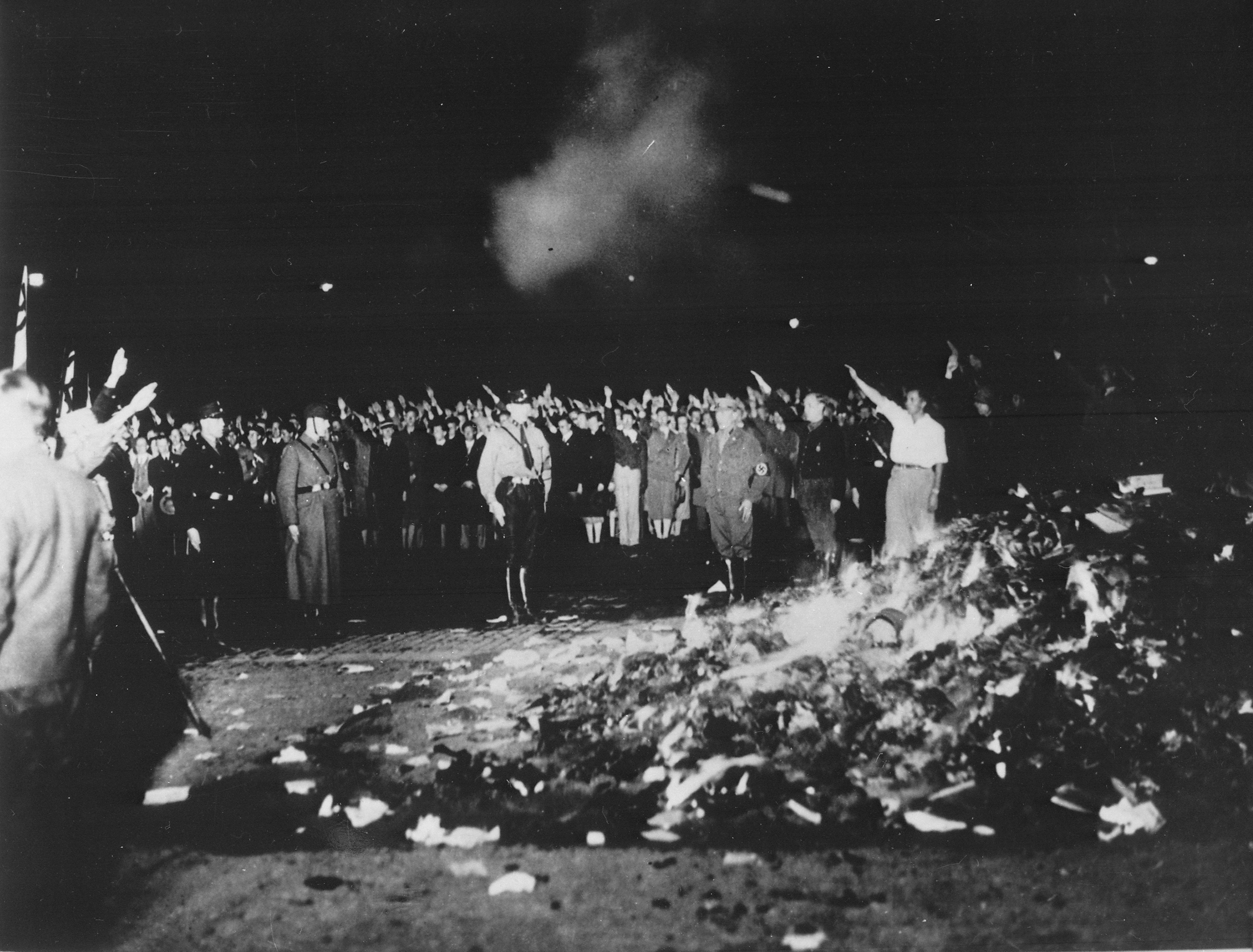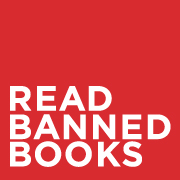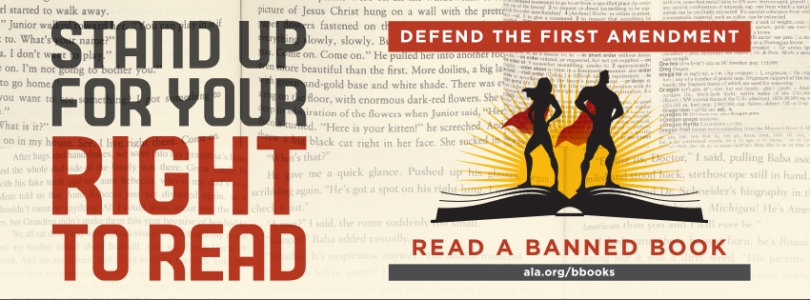After kicking off Banned Books Week with yesterday’s introduction post on how and where books are being banned, I want to continue this series today by highlighting why banning books is such a problematic issue.
But first, let me tell you a story…
It’s a cool night in May and it’s pouring down. You’re standing in a public square with thousands of other people – nameless faces. You’re facing the direction in which a man is speaking in the middle of the crowd, but you’re not looking at him. Your eyes are fixed on the building in the background – the opera house. The opera in front of you, the university at your back – you’re standing right in a center of culture and knowledge. The rain is soaking through your clothes; soaking everything. Fabric, Paper, Wood… You can feel the mood of the crowd shifting, although you’re not aware of any sounds. Everything feels surreal. It suddenly smells like gasoline. You glance at the trucks in the distance, loaded with books. Thousands of them. Enough to fill a whole library. Just then, there’s an explosion of glowing light in the center of the square. You turn your head back and all the nameless faces are illuminated by the glow of the fire, flames soaring high into the night sky. When something lands in the fire with a thud and sends sparks flying, the reality of it all sends your stomach plummeting to the ground.
.
.
.
It’s the 10th of May 1933 in Berlin and the Nazis have just started burning books with two copies of works by Marx and Kautsky. When the night is over, almost 25,000 books will have fallen victim to the flames – in Berlin alone.

All of those books had previously been removed from libaries, public and private, based on an initial blacklist put together by a private person. That first original blacklist listed 71 titles for the category fiction.
In the years following, more and more titles were added and an official list of forbidden authors and works was established. In 1935, just two years after the initial book burnings, the list comprised over 12,000 titles (for all categories).
Two notable works that are still among the canon of world literature today which were already part of the initial book burnings were Ernest Hemingway’s A Farewell To Arms and Erich Maria Remarque’s All Quiet On The Western Front.


I’m sure most of you know that the protagonists in both of these novels are soldiers in World War I. Neither Hemingway nor Remarque sugarcoated the horrors of war or glorified the actions of the soldiers.
The Nazi regime on the other hand did everything in their power to do just that – to glorify war and the soldiers fighting it. Soldiers who had fought in World War I were celebrated heroes. Later, during World War II, the newsreels and the radio news were filled with joyful announcements about glorious victories of the German Wehrmacht – no word about horrible losses, people starving to death, soldiers having their limbs blown off.
So naturally, in order to keep up that false pretense of the happy-go-lucky war, the Nazi regime could not allow people to see even the slightest glimpse of what war really means – not even in fiction. And so Hemingway[‘s] and Remarque[‘s works] were among the first to be burned at the stake.
It’s not surprising that oppressive regimes love to ban books. An oppressive regime doesn’t want you to have access to the information that enables you to form your own opinion.
 source: geekxgirls.com
source: geekxgirls.com
Now, you might ask what all of that has to do with the book banning taking place today, specifically in the USA. Books aren’t legally prohibited by the government after all, the First Amendment to the constitution makes that impossible.
Congress shall make no law respecting an establishment of religion, or prohibiting the free exercise thereof; or abridging the freedom of speech, or of the press; or the right of the people peaceably to assemble, and to petition the Government for a redress of grievances.
Nowadays, when books are banned, they are banned at a regional or local level and removed from the school curriculum or local libraries.
But in the end, it comes down to the same thing. The censorship in Nazi Germany took place with the removing and burning of all those books – the legal prohibition came later.
censorship
NOUN
1 The suppression or prohibition of any parts of books, films, news, etc. that are considered obscene, politically unacceptable, or a threat to security.
(source: OED online)
censor
VERB
to remove anything offensive from books, films, etc. […]
(source: Cambridge English Dictionaries online)
Note the verb ‘remove’ in the second definition. When parts of the story are removed, that’s censorship.
In the case of Nazi Germany, one side of the story was completely eliminated – by removing it. By removing access to any other version of the story that wasn’t in line with the official propaganda.
Now when books are being banned in the US today, access to those books is removed as well. It doesn’t matter that this doesn’t happen on a national scale. The scale is irrelevant. It’s censorship all the same.
Consider this: for someone who can’t get a book they were looking for from the local library, it might not be a problem – they might be able to buy the book online or drive to the neighboring town’s library and get it there. BUT these are only possible solutions to the problem if the person in question
a) has the means to travel to a neighboring town, usually a car or
b) has the financial means to be able to afford a book.
This should make one thing very clear: the ones who suffer the most from this kind of censorship are the poor and children.
Especially considering that you need to have a specific book in mind in order to notice its absence from the shelves in the first place. Children usually don’t browse books on goodreads or hear their colleagues at work chatting about some fantastic new release. When children go to the library, they aren’t looking for specific books, they browse the shelves. Their choice of what to read is made based on what’s available to them. And with books being banned, their options are being limited. Their choice is being limited. A choice has already been made for them.
Anyone who wants to and does ban books is simultaneously admitting that they want to limit people’s choice to the version they approve of. Banning books means admitting that you don’t want the targeted group of people to have an option. Banning books means that you want to indoctrinate others with your own belief.
That is harmful. And that is censorship.
Censorship is always harmful. No matter the scale.


Are you participating in Banned Books Week? What do you think about banning books? Do you have any favorite Banned Books?


Excellent article. I like your point about how oppressive regimes love to ban books. Oppressive organizations of every kind love to ban books. One of the 4 markers of being involved in a cult (political, religious etc.) is that they control your access to information. Being aware of what is going on outside of the controlled environment is death to oppressive organizations. One reason why awareness about censorship is so important. Keep blogging, I love it!
LikeLiked by 2 people
Thank you! 🙂
And you’re absolutely right of course. I wasn’t consciously aware that that was one of the markers for being in a cult, but it makes perfect sense.
LikeLiked by 2 people
I agree. I really good post on a great blog.
LikeLiked by 1 person
Love this! Hits right at the heart of why we must not accept censorship! Thank you for sharing the link.
LikeLiked by 1 person
Thank you for checking it out 😉
LikeLiked by 1 person
Fantastic post! I especially love the part where you talk about taking the choice away from certain audiences (such as children) thats a brilliant point to make!
LikeLiked by 1 person
Thank you! I just wanted to talk about the core of the issue. I feel like it’s so easy to think the banning of books today isn’t a problem because it only happens on such a small scale and the books aren’t actually prohibited by law.
LikeLike
You’re right there! Because it’s so rarely done on an extreme scale (burning of books) we’re all probably a little guilty of not even thinking about it happening.
LikeLiked by 1 person
Great post! You’re totally right about the Goodreads thing for kids. What they see is what’s available to them at the library. And we shouldn’t limit that.
I don’t get why people power trip so hard on controlling what kids read. Its ridiculous.
My Banned Books Post today is about the Top 5 Badly Behaved Sci-Fi Novels. So naughty they got themselves banned.
LikeLiked by 1 person
Thanks 🙂 ah yes… Emphasis on “controlling”…
Your post sounds hilarious! I’ll be sure to check it out in a bit!
LikeLiked by 2 people
[…] the series with a short post about the event as well as how and where books are being banned. The second post demonstrated why the banning of books is such a problematic practice with an excursus on an ugly […]
LikeLike
Now this is one hell of a post! ❤ You really did your homework here :D. And I actually never thought of the books that are available to children. Come to think of it now, I read a lot of crappy stuff because of it! If I'm ever so lucky to have children, I will buy so many books for them (apart from their library visits). But you're right about the second most targetted group as well there: if I were poor, I wouldn't be able to buy those books for my children either. Did I say this was a great post yet? 😀
LikeLiked by 1 person
Thank you ❤ I definitely read a lot of weird shit due to library visits as well 😀 But I also read some great books that I wouldn't have read otherwise! I loved going to the library so much and I loved browsing the shelves as long as I wanted and looking at lots and lots of books and figuring out what I'm interested in. The thought that lots of books might not have been there – and not because the library simply didn't have them, but because strangers wanted to control what I read – makes me angry even today. [PS: I didn't have that problem, but even the thought of that happening irritates me to no end.]
LikeLiked by 1 person
Haha, weird shit it is XD. True, sometimes you just see something and think “Meh, why not?” and discover something awesome! Oh, the thought pisses me off as well. Who are they to decide what we can and can’t read/do?
LikeLiked by 1 person
Exactly!
LikeLiked by 1 person
[…] the series with a short post about the event as well as how and where books are being banned. The second post demonstrated why the banning of books is such a problematic practice with an excursus on an ugly […]
LikeLike
Very well articulated, M. I am proud of you for going right to the largest, scariest, most well-known example of Nazi Germany. We need to keep in mind that these things always start small, and we can’t stand by and let the ripples grow into waves!
My library put together a display near the children’s section about challenged books this week. I live in Madison, WI, and it’s a very progressive town. The books can’t stay on the shelves. But our city is well-educated and fairly well off financially. I am sad knowing that other towns don’t have this available to them. We really need to get these books to those with fewer resources.
LikeLiked by 1 person
Thank you! And I agree, that’s a very important aspect. If we allow one book to be banned, others will inevitably follow. Classic snowball system. And we cannot let that happen.
I’m glad to hear your library does something for banned books week 🙂 and that it’s not such a big issue for your town.
I also agree. Especially because without access to books and information in general, it doesn’t help education either.
LikeLiked by 1 person
Excellent post! Love it!
LikeLiked by 1 person
[…] On The Practice Of Banning Books Pt.2: The Problem Pt.3: The Reasons Pt.4: Let’s Talk About Sex, […]
LikeLike